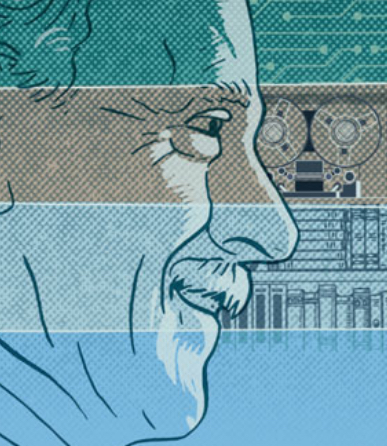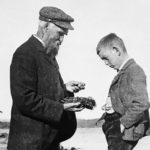
Boxes of uncatalogued books, collected over Marshall McLuhan’s lifetime of study and reflection, become the medium through which a grandfather relays his message to his grandson
AT THE BOTTOM OF WILD OAK LANE IN PRINCE EDWARD COUNTY, is a mailbox that sits on a well-wintered cedar pole. It’s an everyday rural-style mailbox, painted in black enamel with a civic address cleanly set in white, Times New Roman font. Over time, the mailbox has become a symbol of communication, a basic need of humankind. Today, this particular mailbox serves as a visual reminder of the impact of communication on the world and the lifetime work of one individual – Herbert Marshall McLuhan.
A gravelled driveway rises from the main road, tunnels through shadows of older sugar maple trees, past a single storey, white frame house and then leads to a set of 19th century farm buildings. Within one of these buildings is a renovated space where Andrew McLuhan, Marshall McLuhan’s grandson, is seated at a sturdy wooden refectory table. It is here where Andrew, in 2009, catalogued the working library of his grandfather. The extensive library, inherited by Andrew’s father, had been stored here after Marshall McLuhan’s death in 1980. The inner change precipitated by that one event fuels Andrew’s efforts today.
Born in Edmonton, Marshall McLuhan is considered one of the leading communication theorists in the modern world. He studied how media, in all its forms, has the power to transform human consciousness, how communication tools affect our habits and our minds, and shapes our thoughts in sociology, art, science or religion. The Gutenberg Galaxy: The Making of Typographic Man, published in 1962, was the first of McLuhan’s works to reflect on the transfer of ideas in society. In particular, Galaxy spoke to Johannes Gutenberg’s invention of the printing press in the 15th century and how it spun the dial on the spread of knowledge.
Cataloguing McLuhan’s book collection was a challenge for Andrew. “Up until that point, I didn’t fully understand the true meaning of the pioneering work of my grandfather,” Andrew offers. “I had no cataloguing experience and was guided by instinct.” He set up a spread sheet and began the work. “The volumes had been sitting in random-sized cardboard boxes for years. They were in a range of condition – some with torn dust jackets and fragile bindings – dog-eared titles and signed first editions among the brand new. Others had excerpts from lectures: a note on Abbey Hoffman here, a letter to Marshall from Ezra Pond there,” he lists. “I would absorb Marshall’s abbreviated codes through osmosis. It became clear that if a book was in the boxes, it meant something to him and why he kept it,” Andrew points out.
“Marshall McLuhan’s coining of the phrase ‘the medium is the message’, his prediction of the coming of the internet and the idea of the global village seemed to be well understood, but I wasn’t a schooled intellectual like my dad or my grandfather,” Andrew discusses. He moves from his upright chair to a nearby wall where he takes down a small, hand-soldered copper frame. Under the glass is a strip of birch bark. The sepia-hued inner skin of the bark has a tight, handwritten notation in crisp black ink: Marshall McLuhan July 5 1931. “At the end of his first year of engineering at the University of Manitoba, he worked on a survey crew in northern Manitoba, but didn’t return to engineering. He switched his area of study to English literature and philosophy. He said in later quotes that he began to ‘read himself into literature’…investigation was for him,” Andrew says. “He used that piece of bark as a bookmark. I found it between some pages in the process of my own discovery,” he furthers.
“I knew Marshall’s work was important but I was a lay person who dropped out of journalism school. I mean concepts like neuro-plasticity – how the brain changes to what it encounters – were pretty far out for me. But the inventory project changed all of that,” Andrew reveals. The complexity of his grandfather’s ideas became clearer as Andrew found insight into the man’s working chronology.
The very essence of Gutenberg’s invention – the dissemination of ideas through mass print – captured Marshall McLuhan’s imagination. His search for understanding uncovered a house of knowledge. Ironically, while McLuhan ventured that the printed book was fated to disappear, he assembled a broad collection. James Joyce’s Finnegan’s Wake, volumes by George Eliot (Mary Ann Evans), four volumes by Alexis de Tocqueville’s Democracy in America sat alongside thousands of titles that fuelled his inquiry. “We can only correct the true bias of the present by coming to know that time is A time not THE time,” McLuhan went on to write. “Each age has to recreate Homer and Shakespeare in its own image.” In a note tucked into a copy of the University of Toronto Quarterly from January 1950, McLuhan furthered his thoughts: “This is no mean task because in doing so, you have to become them.” This was but one of the many clues that Andrew unearthed.
“Marshall said that theories were assumptions. He asserted that he probed, that he was an explorer,” Andrew picks up the conversation. “He didn’t prophesize but simply advanced his investigation through study and took the lead over his contemporaries because he responded to his time. But he certainly gave credit to Harold Innis for opening the way,” he adds.
A foremost Canadian thinker, Harold Innis warned that Western civilization was imperilled by powerful advertising media that was obsessed by “present mindedness, on the continuous, systematic, ruthless destruction of permanence essential to cultural activity.” Under the auspices of the University of Toronto, in 1946, Innis, along with Eric A. Havelock formed the loosely named Toronto School – a school of thought that took the theoretical view that “communication systems create psychological and social states”. In that same year, having earned his doctorate from Cambridge University in England, Marshall McLuhan joined the University of Toronto as professor of English literature and subsequently signed onto the Toronto School of thought. The shelves in his office sagged under the weight of an ever-expanding library as McLuhan applied his career as a popular lecturer at the university until the end of his life.
Marshall McLuhan’s books – The Mechanical Bride: Folklore of Industrial Man (1951); Understanding Media (1964) and The Medium is the Massage (1967) – explored the forms in which people receive information, the forms themselves being more important than the messages. In the same year that McLuhan’s The Gutenberg Galaxy was released, sitting in his collection was American author Rachel Carson’s Silent Spring. While McLuhan’s work spoke to how the invention of the printing press changed the world, essentially creating a global village, Carson’s writings, which began with ‘a fable for tomorrow’, described how the advance of science could change the natural world. She pointed to the need to anticipate the ramifications of our discoveries and, in fact, her book ultimately led to the banning of DDT. McLuhan reinforced her theories, “There are no passengers on spaceship earth. We are all crew.”
“Marshall and my father studied, wrote and spoke, which led to the understanding of how devices can rewire our brain – our inner ecology,” Andrew pauses, leans to the screened-in window.
Cataloguing Marshall McLuhan’s library drew Andrew deeper into his grandfather’s work. “Another person could have done the job more objectively and faster, but I became hooked in a personal way. Each box was a treasure chest,” he adds. In fact, 203 containers silently awaited Andrew. In total, 6,411 titles with scribbled memos, margin notescum- trail makers led Andrew closer and closer to a person he would get to know through that person’s intellectual development. Page after opened page led to a grandson’s understanding of his grandfather’s curiosities.
“His books were his tools,” Andrew addresses. As Marshall McLuhan’s ideas evolved, he would revisit his books. “You can witness how his writing changed from a tight control to getting sloppier as he matured,” he continues. While Andrew was too young to remember his grandfather, tracking the margin bits written in each volume gave him an insider’s view of the man and his calling. It also led to a better understanding of his own father. “Marshall’s writings are written in pen. My father’s jottings are in pencil. In an uncanny way, they translate into messages for me,” he wonders.
“I encountered more than a collection of books. Libraries are alive, not just repositories of knowledge. They hold onto things left behind by previous readers,” Andrew accepts. “On a personal level, while my dad worked with his father as a co-worker – as a deep, learned scholar – I came to terms with not being a scholar,” Andrew considers. “It isn’t what’s being left behind but what is given to us to go forward that is important. I figured that if I could understand the work, anybody could understand it. That was my advantage,” he establishes.
“I began to reflect on my purpose in all of this,” Andrew shares. “I now see my role as reaching out to non-academics, to become a bridge to those who are shaping the technology that is shaping us,” he adds. “My heart welcomed this intellectual inheritance. Media literature, media ecology, to use environmental terms, implies stewardship,” he furthers.
Now a father of two children, Andrew feels he has an ongoing responsibility to address the impact of media on today’s early learners. Using the insight of his patriarchal ancestors, he created the McLuhan Institute, an umbrella organization for teaching and workshops convened around understanding the forces of technological invention within our culture. Standing by the window, Andrew reflects on the day, almost a decade ago, when he bid farewell to the McLuhan collection.
It was around 11 on a Tuesday morning in March of 2011, the sun already gathered in the stark branches of the sugar maple trees that framed the driveway off of Wild Oak Lane, when a five-ton cargo truck backed to the main door of the barn on the McLuhan property. Box after box of books were loaded onto the transport by two movers. Andrew’s assignment then complete, his grandfather’s working library was headed to its permanent home in the Fisher Library at the University of Toronto, two and a half blocks from the former office that was once Marshall McLuhan’s. “I was very sad in the parting,” Andrew pauses. “I had bonded with the books and through them, with my grandfather. But it helped knowing that they weren’t going too far and that I could visit just about any time,” he finishes.
Marshal McLuhan’s papers, previously deposited with the National Archives in Ottawa, and the renowned philosopher’s working library are today included in UNESCO’s Memory of the World Registry, the intellectual equivalent of a World Heritage Site


